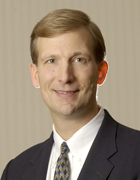
When one is lucky enough to have a Joseph Coughlin, Ph.D., in the house, it would be wise to sit down and soak up every word you can. You could also offer him a place to sit, but sitting still doesn’t seem high on his list of priorities, so boundless are his energy and ideas for the future of aging services.
His keynote address Tuesdayat the LeadingAge annual meeting illustrated why.
Sporting a bow tie, energetic pacing and a razor-sharp wit, the director of the Massachusetts Institute of Technology’s AgeLab gave a binder full of takeaways to the approximately 4,000 providers in attendance.
Among the most emphatic: You need to get help. That means looking for linkages with entities that might not even currently be LTC provider partners. Retail stores, pharmacies, financial services experts and non-traditional government agencies – all could provide opportunities to thrive.
“Within two to three years,” Coughlin asserts, retailers such as Walgreen’s will be opening “major chronic specialty disease stores” that will offer services directly to consumers.
The key for LTC providers is to try to partner with some of these players, rather than run for the nearest foxhole or put up their claws to fight back.
There is no question in his mind that an onslaught is coming. “We’re very well on our way to making 100 the new ‘normal,’” said the world-renowned analyst of demographic, social, technological and policy trends. Finding ways to help people live longer AND better is just “too big to do alone,” he repeated several times.
He believes providers hold a great deal of power because they know the populations they serve, whereas financial services providers and others newly putting their irons in the fire would be more like outsiders, at least temporarily.
The key for anyone will be developing tools to cut through the clutter. With so much information available via the Internet, people don’t necessarily need or want more of it, Coughlin explained. They want clarity. They want solutions. They want desirable outcomes, and they don’t have to be delivered by the newest gadgets..
“Technology is not innovation,” he reminded the attendees. “It enables innovation.”
Perhaps above all, Coughlin urged providers to learn to be a trusted filter and adviser. More than ever, families will need clarity on how to handle their loved ones’ care and multiplying service options.
The time is ripe for those who can help cut through the clutter, preferably with turnkey solutions, Coughlin repeated. And it’s a safe bet nothing is liable to get any simpler any time soon.



